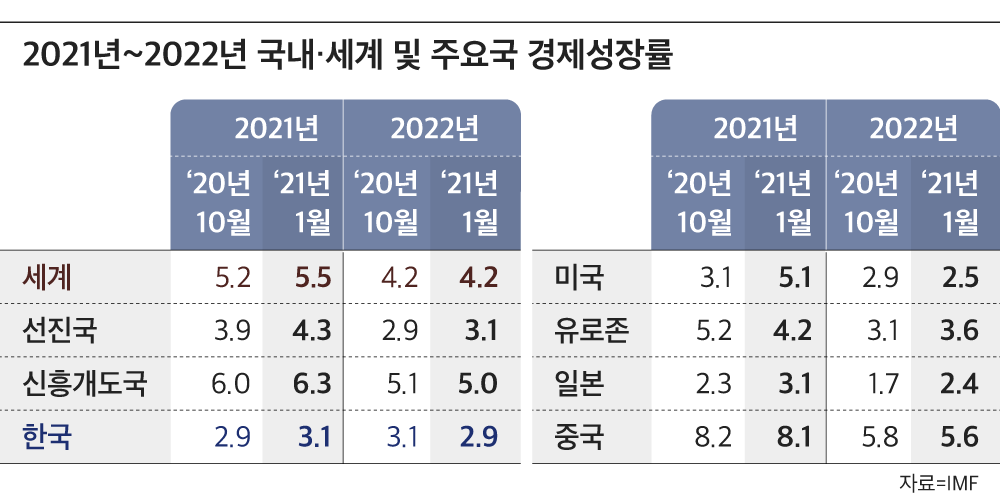Input 2021.01.26 22:00
Korea’s growth rate adjusted from 2.9 to 3.1%
Recommend “gradual reduction in policy support when economic activity is normalized”
The International Monetary Fund (IMF) raised Korea’s annual economic growth rate by 0.2 percentage points (P) this year. The Ministry of Strategy and Finance explained that it was the result of high evaluation of the active quarantine and policy response of the novel coronavirus infection (Corona 19).
On the 26th, the IMF announced the’Revision of the World Economic Outlook’ and adjusted Korea’s economic growth rate to 3.1% this year, 0.2 percentage points higher than the forecast for October last year (2.9%). In addition, last year, Korea’s economic growth rate also raised 0.8%p to -1.1%. IMF releases World Economic Outlook (WEO) in April and October and revised World Economic Outlook in January and July.

Korea is also projected to be at a higher level than other countries in the combined growth rate, plus the growth rate of last year and this year. The combined growth rate refers to the extent to which Korea’s real economy recovers to pre-Corona 19 levels. Korea’s combined growth rate was 2.0%, higher than the US (1.5%), Germany (-2.1%), Japan (-2.2%), France (-4.0%), Spain (-5.9%), and Italy (-6.5%). .
The IMF predicts that the global economy will grow 5.5% this year. This is a 0.3 percentage point higher than the forecast (5.2%) announced in October last year. The forecast for 2022 maintained the forecast at 4.2% growth. The economic growth rate in 2020 was -3.5%, up 0.9 percentage points from the previous forecast (-4.4%).
The IMF raised the global economic outlook, saying, “Through the approval of vaccines at the end of last year and the start of vaccinations and recent economic indicators, the growth momentum in the second half of last year was better than expected.” Positively reflected in the outlook for 2021 and 2022. However, negative factors such as re-proliferation and containment of Corona 19 and delay in vaccines are also present.”

Vaccines are expected to be widely distributed in developed and some emerging countries this summer and most other countries by the second half of 2022. Corona 19 predicts that by the end of 2022, regional infections will decrease to a globally low level. Financial aid predicted that the fiscal balance will improve in most countries other than some countries, such as the United States and Japan. In addition, the financial conditions predicted that major central banks would maintain the current interest rate until the end of 2022.
The IMF predicted the economic growth rate of developed countries at 4.3% this year. This is 0.4%p higher than the previous forecast. Emerging countries presented an increase of 0.3%p to 6.3%. Developed countries have strong policy support and expectation of widespread vaccine distribution this summer. Emerging countries are the result of high growth in China (8.1%) and higher growth rates in India (8.8% → 11.5%).
The IMF also mentioned the upside and downside risk factors for this year’s economic growth rate. Upside risks include an early ending of the pandemic due to the development and distribution of vaccines and the development of treatments, improvement of the psychology of businesses and households, and additional financial expansion. Downside risks were viewed as the re-proliferation of Corona 19 and the strengthening of containment measures, delayed vaccine release, increased social unrest, hastily halted policy support, and reduced financial conditions.
The Ministry of Information and Communication introduced the IMF’s policy recommendations along with the forecast of the economic growth rate. According to the Ministry of Science and Technology, the IMF emphasized that “we need to secure financial resources in the health sector, and strengthen international cooperation to improve vaccine accessibility in all countries.” “In case of normalization of economic activity, policy support should be gradually reduced while promoting a wide range of policies to support economic recovery.” In addition, if the national debt is unsustainable, the debt should be readjusted through the framework agreed upon in the G20.”
The IMF also said, “It is necessary to prioritize overcoming the damage caused by Corona 19, such as slowing productivity, increasing inequality, sluggish accumulation of human resources, and intensifying poverty.” “We need to strengthen international cooperation to resolve conflicts, etc.”
